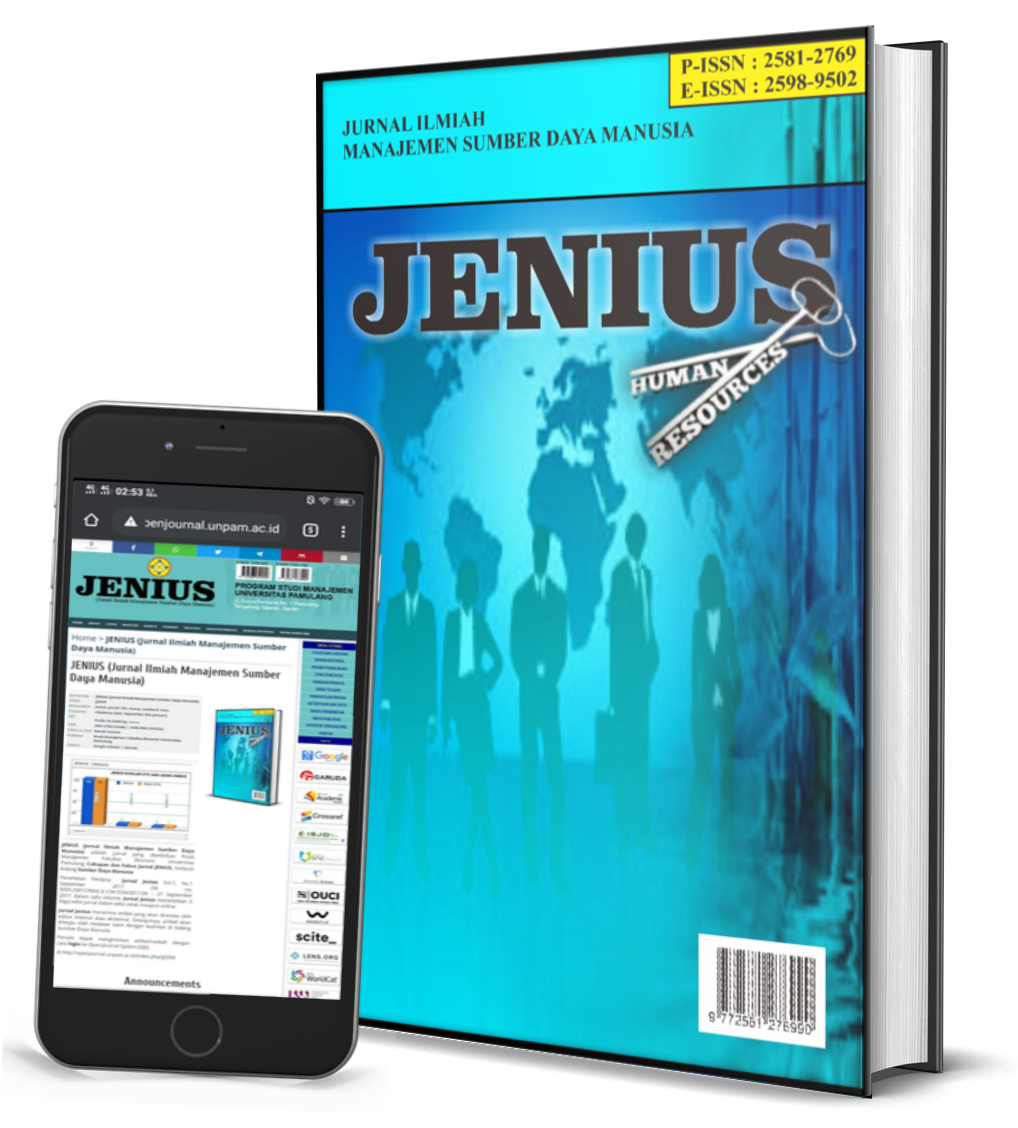The The Impact of Digitalization on Human Resource Management Practices
DOI:
https://doi.org/10.32493/JJSDM.v8i1.42888Abstract
Human Resource Management (HRM) is a discipline that focuses on managing employees within an organization to achieve the company’s strategic goals. With the advent of the digital era and the Fourth Industrial Revolution, digitalization has become a significant force that has transformed various sectors, including HRM. Understanding the impact of digital transformation on HRM is important for enhancing organizational performance. This article reviews relevant literature related to the main problem addressed. The findings reveal how digital transformation in HRM enhances the efficiency and effectiveness of HR processes by streamlining employee recruitment, selection, orientation, training, and development. Technology also increases employee engagement through self-service portals and communication platforms that facilitate better collaboration and interaction, thereby boosting employee productivity. Digital engagement platforms enhance internal communication, employee satisfaction, and retention by improving interaction and feedback mechanisms. However, digitalization introduces challenges, including concerns over data security and privacy, as well as the need for HR professionals to continually adapt to new technologies. Therefore, companies must understand the potential for both success and failure in digital strategies, especially in Human Resource Management practices. This understanding is crucial for ensuring increased efficiency and competitiveness in the digital era.
References
1. Allen, N. (2020). Use digital technology to our advantage. Nature, 578(1), 226–227. https://doi.org/10.1038/d41586-020-00296-x.
2. Bailey, C., Mankin, D., Kelliher, C., & Garavan, T. (2018). Strategic human resourcemanagement. Oxford University Press.
3. Bashir, U., Toqeer, R. ., & Shah, S. M. A. (2024). Exploring the Role of Digital Human Resource Practices in Organizational Performance to Ensure Efficiency. Bulletin of Business and Economics (BBE), 13(2), 226-231. https://doi.org/10.61506/01.00319
4. Ekuma, K. (2024). Artificial Intelligence and Automation in Human Resource Development: A Systematic Review. Human Resource Development Review, 23(2), 199-229. https://doi.org/10.1177/15344843231224009
5. Gilch, P. M., & Sieweke, J. (2021). Recruiting digital talent: The strategic role of recruitment in organisations’ digital transformation. German Journal of Human Resource Management, 35(1), 53-82. https://doi.org/10.1177/2397002220952734
6. Fajriyani, Dini, Achmad Fauzi, Made Devi Kurniawati, Adam Yudo Prakoso Dewo, Arif Fahri Baihaqi, and Zulkarnain Nasution. (2023) .Tantangan Kompetensi SDM Dalam Menghadapi Era Digital (Literatur Review). Jurnal Ekonomi Manajemen Sistem Informasi, 4 (6), 1004–13. https://doi.org/10.31933/jemsi.v4i6.1631.
7. Hamadamin, Halbast Hussein, and Tarik Atan. (2019). The Impact of Strategic Human Resource Management Practices on Competitive Advantage Sustainability: The Mediation of Human Capital Development and Employee Commitment. Sustainability, 11(20), 5782. https://doi.org/10.3390/su11205782
8. Hermawanto, A. & Anggraini, M. (2020). Globalisasi, Revolusi Digital dan Lokalitas. LPPM Press. Yogyakarta.
9. Kabul, ER. (2024). Penggunaan Teknologi HRM ( Human Resource Management) Untuk Meningkatkan Efisiensi dan Efektivitas Manajemen Sumber Daya Manusia. Blantika: Multidisciplinary Jornal, 2(4), 427-435.
10. Kamalakannan, A. (2024). The Integration of Digital Transformation with Human Resource Management - A Theoretical Point of View. International Journal of Scientific Research in Engineering and Managemen, 08(02).
11. Laura, K., Lee, F. V., Pranoto, E., Gunawan, K., Lim, K., Fransisca, C., & Christine, N. (2024). Dampak Perkembangan Teknologi Terhadap Manajemen Sumber Daya Manusia. Gudang Jurnal Multidisiplin Ilmu , 2, 31–34.
12. Lestari, E. R. (2019). Manajemen Inovasi: Upaya Meraih Keunggulan Kompetitif. Universitas Brawijaya Press.
13. Li, F. (2020). Leading digital transformation: three emerging approaches for managing the transition. International Journal of Operations & Production Management, 40(6), 809-817.
14. Long, N.D.B., Ooi, P.T. Le, T.V., Thiet, L.T., Ai, T.V., An, L.Q., Hudson, A., Tan, K.S., Van, N.T.L., 2022. Leading in the Age of the Fourth Industrial Revolution – A Perspective from Vietnam. International Journal of Technology, 13(5), 949-957.
15. Mohajan, HK. (2021). Third Industrial Revolution Brings Global Development. Journal of Social Sciences and Humanitie, 7 (4), 239-251. http://www.aiscience.org/journal/jssh
16. Mubarik, M. S., Shahbaz, M., & Abbas, Q. (2022). Human capital, innovation and disruptive digital technology: A multidimensional perspective. Taylor & Francis.
17. Munir, Q., Akram, B., & Abbas, S. A. (2024). Understanding Stock Price Dynamics with Dividend-Related Metrics and Financial Indicators in Pakistan’s Non-Financial Sectors. Journal of Business and Economic Options, 7(1), 1-9.
18. Namadi, S. (2023). Strategic Management of Outsourcing Balancing Profitability and Cost Control in Corporate Operations. Journal of Business and Economic Options, 6(4), 26-32.
19. Nasution, A. H., & Kartajaya, H. (2018). Inovasi. Penerbit Andi.
20. Priyono & Marnis. (2023). Manajemen Sumber Daya Manusia. Sidoarjo: Zifatama Publisher.
21. Riyadi, Muhammad Kadar, and Martani Huseini. 2019. “Inovasi Sistem Manajemen Kinerja SDM Terintegrasi Dengan Big Data Di BPJS Kesehatan. Jurnal Wira Ekonomi Mikroskil, 9 (1), 41–54. https://doi.org/10.55601/jwem.v9i1.601.
22. Rusby, Z. (2017). Manajemen Sumber Daya Manusia. Rajawali Press.
Downloads
Published
How to Cite
Issue
Section
License
Copyright (c) 2024 Fenska Seipalla, Nadia Liem, Deorina Roully Gratia Siregar, Ardhin Martdana, Vip Paramarta

This work is licensed under a Creative Commons Attribution 4.0 International License.
Authors who publish in this journal agree to the following terms:
The author owns the copyright of the article and assigns to the journal the right of first publication with the work simultaneously licensed under the terms Atribusi 4.0 Internasional (CC BY 4.0)
 which allows others to share the work with acknowledgment of the work's authorship and initial publication in this journal.
which allows others to share the work with acknowledgment of the work's authorship and initial publication in this journal.Authors may enter into separate additional contractual arrangements for the non-exclusive distribution of the published journal version of the work (for example, posting it to an institutional repository or publishing it in a book), with acknowledgment of the work's original publication in this journal.
Authors are permitted and encouraged to post their work online (for example, in institutional repositories or on their websites) before and during the submission process, as this can lead to productive exchanges, as well as earlier and larger citations of published work (See The Effect of Open Access).






.png)

